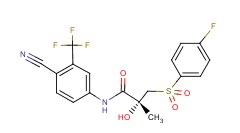10.1016/j.bmc.2011.10.067
This research presents the design, synthesis, and biological evaluation of 4-phenylpyrrole derivatives as potential androgen receptor antagonists for the treatment of castration-resistant prostate cancer. The study aimed to develop novel orally available antagonists effective against both wild-type and mutant androgen receptors, including those resistant to existing therapies like bicalutamide. The researchers synthesized a series of 4-phenylpyrrole derivatives and evaluated their efficacy against prostate cancer cells, including those resistant to standard treatments. The compound 4n, in particular, showed strong inhibitory effects on tumor cell growth and was effective against both androgen-dependent and bicalutamide-resistant prostate cancer cells in mouse xenograft models. The chemicals used in the synthesis process included various 4-phenylpyrrole derivatives, reagents for organic synthesis such as nitroethane, nitromethane, benzaldehyde, and a range of catalysts and solvents necessary for the reactions, such as n-butylamine, potassium hydroxide, and tetrahydrofuran. The study concluded that the series of pyrrole compounds, with 4n as a lead, are novel androgen receptor antagonists with potential therapeutic effectiveness against prostate cancer, including castration-resistant forms.



 Xi
Xi


